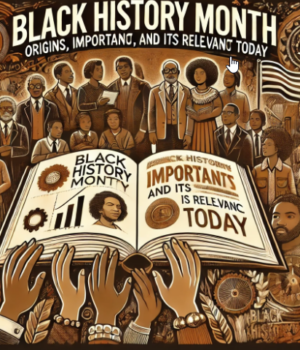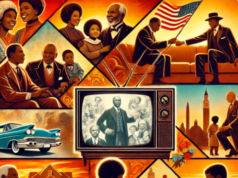# Black History Month: Origins, Importance, and Its Relevance Today
## The Origins of Black History Month
Black History Month, celebrated every February in the United States and Canada, is a time to recognize the achievements, contributions, and history of African Americans. It serves as a reminder of the struggles and triumphs that have shaped not only Black history but also the history of the nation as a whole.
### How Did Black History Month Begin?
The origins of Black History Month can be traced back to 1926 when historian **Carter G. Woodson**, often referred to as the “Father of Black History,” established **Negro History Week**. His goal was to highlight Black history and counteract the widespread omission of African American achievements in mainstream education and literature.
Woodson chose the second week of February to coincide with the birthdays of **Frederick Douglass** and **Abraham Lincoln**, two influential figures in Black history. Over time, the movement to highlight Black achievements grew, and in 1976, during the United States Bicentennial, **President Gerald Ford officially declared February as Black History Month**.
Since then, Black History Month has expanded beyond the U.S., with Canada and the United Kingdom also recognizing and celebrating Black history in February and October, respectively.
## The Importance of Black History Month
### Recognizing Black Excellence
Black History Month is more than just a commemoration—it provides an opportunity to **acknowledge the significant contributions of Black individuals** to fields such as:
### Addressing Historical Injustices
Black History Month also plays a crucial role in **addressing historical and ongoing racial injustices**. By reflecting on the past, we can learn about:
### Encouraging Education and Awareness
One of the primary reasons Black History Month remains vital today is its role in **promoting education**. Schools, universities, and institutions dedicate time to teaching previously overlooked aspects of history, helping people gain **a broader perspective on the Black experience**.
By learning about key figures and events, individuals can gain a deeper appreciation for the profound impact of Black communities on society.
## Black History Month Today: Where It Stands
### Increased Recognition and Corporate Involvement
In recent years, Black History Month has gained even more visibility, with corporations, media outlets, and educational institutions actively participating in observances. Many companies now:
While this increased visibility is a positive step, some critics argue that corporate involvement often feels performative, with businesses only recognizing Black history during February without demonstrating long-term commitment to racial equity.
### Challenges and Criticism
Despite its importance, Black History Month faces criticism in various ways:
### The Future of Black History Month
To ensure Black History Month remains relevant and impactful, it must continue evolving. Some potential ways to strengthen the movement include:
## How to Participate in Black History Month
Whether you’re an educator, student, or community member, there are several meaningful ways to engage with Black History Month:
### 1. Educate Yourself and Others
Reading books, watching documentaries, or attending lectures on Black history can be a powerful way to learn and share knowledge. Some recommended books include:
### 2. Support Black-Owned Businesses
Shopping from Black-owned businesses is a direct way to show support and contribute to economic empowerment within the Black community.
### 3. Engage in Conversations About Racial Justice
Discussing racial justice and equality with friends, family, and colleagues can help foster understanding and encourage action.
### 4. Participate in Local Events
Many cities host lectures, performances, museum exhibits, and cultural festivals dedicated to Black History Month. Attending these events can be an enriching experience.
### 5. Advocate for Change
Beyond February, it is important to support policies and movements that promote racial justice, equality, and equity in various sectors, including education, healthcare, and criminal justice.
## Conclusion
Black History Month is more than a celebration—it is a **crucial time to honor, reflect, and act**. While progress has been made in recognizing Black contributions, there is still more work to do to ensure that Black history is **acknowledged year-round and incorporated into broader conversations** about justice and equality.
By participating in Black History Month thoughtfully and intentionally, individuals and communities can contribute to a more informed and inclusive society.








